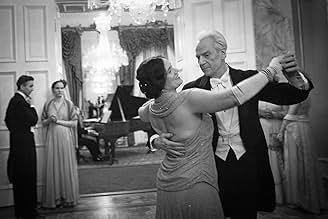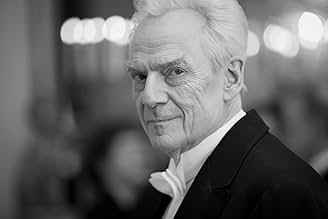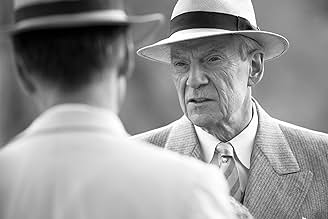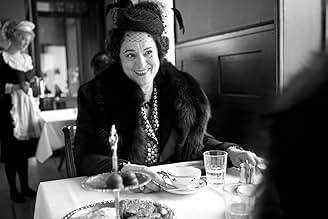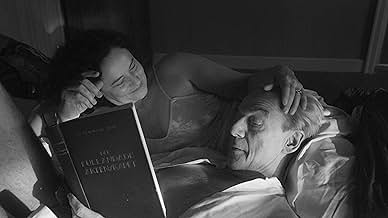A story based on the life of journalist Torgny Segerstedt, who alerted the Swedish public to the threat of Fascism in the 1930s.A story based on the life of journalist Torgny Segerstedt, who alerted the Swedish public to the threat of Fascism in the 1930s.A story based on the life of journalist Torgny Segerstedt, who alerted the Swedish public to the threat of Fascism in the 1930s.
- Director
- Writers
- Stars
- Awards
- 3 wins & 7 nominations total
- Director
- Writers
- All cast & crew
- Production, box office & more at IMDbPro
Featured reviews
Jesper Christensen with his Danish accent isn't very credible in his role as the Swedish newspaperman Torgny Segerstedt, famous for his uncompromising anti-Nazi stance. And could Jan Troell be any more boring director? Instead of making a movie about a man who stould up for liberty and against nazism to a great cost for himself, the director Troell just zeros in on his personal life and mistresses.
Jan Troell is the nestor of Swedish films. He's been directing for 50 years and bringing on Torgny Segerstedt is of course an interesting choice of subject. Segerstedt was one of few journalists who completely stood up against Hitler during WW2. A story of courage in a special way, since Sweden never took part in the war.
So this could have been a discussion about common political morals, but instead it's a discussion about Segerstedt's private life and most of all his mistresses. Of course you can make a movie that way, if it has a substance referring to the man's work, but this isn't the case here. It's more about anybody's love life.
And there isn't any magic about it. The work should be bigger than the man than it comes to somebody like Segerstedt.
So this could have been a discussion about common political morals, but instead it's a discussion about Segerstedt's private life and most of all his mistresses. Of course you can make a movie that way, if it has a substance referring to the man's work, but this isn't the case here. It's more about anybody's love life.
And there isn't any magic about it. The work should be bigger than the man than it comes to somebody like Segerstedt.
The key to this film lies, in part, in understanding the meaning of the title. "The Last Sentence" is an ambiguous translation of the Swedish because a "last sentence" might refer to the last words a man writes. Instead, "sentence" here means the "judgment" one passes on a man who has died--a judgment that endures longer than the judgments that were passed on a man while he was alive.
And this citation of the "Hávamál" (an Old Norse 13th-century poem) has a special resonance in light of a toast proposed by Torgny Segerstedt early in the film: Segerstedt remarks something to the effect that we have a sacred duty to tell the truth in public matters, but no such duty in our private affairs.
Jan Troell has thus given us a portrait of Torgny Segerstedt as a man who fiercely refused to say anything other than the truth about Hitler and Nazism, but who, at the same time, was incapable of acting in a truthful and caring fashion in his private life--a man who seemingly had a deeper attachment to his dogs than to any of the people who deeply loved him.
And Troell has perhaps highlighted the shortcomings in Segerstedt's personal relationships precisely because he wants the viewer to sense this tension in the final judgment we place on the life of a man. Do Segerstedt's attempts to stir the conscience of the Swedes through his writings on the horrors of Nazism cancel out whatever negative judgment we might pass on his conduct as a father, husband or lover?
Maybe Troell poses just such a question because he himself may sense that he's nearing the end of his own life. And so what Troell wants, perhaps, is for us to realize that we are all faced with the question of the measure of a person's life and the final judgment to be passed on that life: what weight to give to the life one has lived in public, visible to all, or to the life that one has lived in the shadows (filled with love and affection or not) of one's private life?
And this citation of the "Hávamál" (an Old Norse 13th-century poem) has a special resonance in light of a toast proposed by Torgny Segerstedt early in the film: Segerstedt remarks something to the effect that we have a sacred duty to tell the truth in public matters, but no such duty in our private affairs.
Jan Troell has thus given us a portrait of Torgny Segerstedt as a man who fiercely refused to say anything other than the truth about Hitler and Nazism, but who, at the same time, was incapable of acting in a truthful and caring fashion in his private life--a man who seemingly had a deeper attachment to his dogs than to any of the people who deeply loved him.
And Troell has perhaps highlighted the shortcomings in Segerstedt's personal relationships precisely because he wants the viewer to sense this tension in the final judgment we place on the life of a man. Do Segerstedt's attempts to stir the conscience of the Swedes through his writings on the horrors of Nazism cancel out whatever negative judgment we might pass on his conduct as a father, husband or lover?
Maybe Troell poses just such a question because he himself may sense that he's nearing the end of his own life. And so what Troell wants, perhaps, is for us to realize that we are all faced with the question of the measure of a person's life and the final judgment to be passed on that life: what weight to give to the life one has lived in public, visible to all, or to the life that one has lived in the shadows (filled with love and affection or not) of one's private life?
Saw it at Busan International Film Festival(BIFF), and it was the most disappointing film of the weekend.
In fact Torgny Segerstedt's story, in which an anti-Nazi journalist became a political martyr, is quite fascinating. His relationships with women are also intriguing drama material. In addition to those good ingredients, the director Jan Troell had one more ambition: making this film as a journey to the mind of Mr. Segerstedt, rather than a bland and harmless biography. What could go wrong?
First of all, making a black and white period piece with digital cameras(Arri Alexa) was not a good idea; especially when you start your film with real archive films filled with gritty film grains. The images here lack any depth of field, resulting in images which are crisp and dull at the same time. The whole feature felt like a cheap TV reenactment of the actual events, rather than an artistic reinterpretation.
The script is not good as well. Without some fantasy elements based on a Bergman tradition, the whole feature consists of a series of important events in the protagonist's life. The timing is always off; things just come and go without proper investments. Most of all, even though it is based on the real events during World War 2, there is no sense of dread or grief.
Even though Jesper Christensen's performance was stellar, I cannot recommend this film. It is a film made with good intentions, but fails to live up to them.
4/10
In fact Torgny Segerstedt's story, in which an anti-Nazi journalist became a political martyr, is quite fascinating. His relationships with women are also intriguing drama material. In addition to those good ingredients, the director Jan Troell had one more ambition: making this film as a journey to the mind of Mr. Segerstedt, rather than a bland and harmless biography. What could go wrong?
First of all, making a black and white period piece with digital cameras(Arri Alexa) was not a good idea; especially when you start your film with real archive films filled with gritty film grains. The images here lack any depth of field, resulting in images which are crisp and dull at the same time. The whole feature felt like a cheap TV reenactment of the actual events, rather than an artistic reinterpretation.
The script is not good as well. Without some fantasy elements based on a Bergman tradition, the whole feature consists of a series of important events in the protagonist's life. The timing is always off; things just come and go without proper investments. Most of all, even though it is based on the real events during World War 2, there is no sense of dread or grief.
Even though Jesper Christensen's performance was stellar, I cannot recommend this film. It is a film made with good intentions, but fails to live up to them.
4/10
Borrowed from a library, this movie was first watched by a friend. Because I had picked the movie because of its theme, I was, hence, tentative. The friend found the movie long and made too complicated with its English subtitles and 'ghosts'. However, this is a friend who cannot sit and watch a movie... has to get up and 'do other things' in 'the boring sections'. Does not work with subtitles.
So, I began to watch it with some apprehension. Which swiftly disappeared. Perhaps because I am an activist/dissident in Canada (and I use such movies to ask myself and others, what makes us so naive about our failed democracies when we have stories like this in our history?), it was the subtitles of the dialogue that struck so true. And, being male, (my friend is female) I could relate with the man's inner turmoil. Making the ghosts of three important women in the main character's life becomes an effective tool for exposing this man's conscience. It is also good to follow up the movie with the extras provided with the DVD.
This is a movie I would buy for my collection of 'movies for reflection' on human behaviour that becomes sad ignorance of situations like this... where governments push down the truth. Sweden might use the excuse that they had to do what they had to do to suppress this man and his defence of freedom of speech. This movie simply emphasizes that we have no excuse.
So, I began to watch it with some apprehension. Which swiftly disappeared. Perhaps because I am an activist/dissident in Canada (and I use such movies to ask myself and others, what makes us so naive about our failed democracies when we have stories like this in our history?), it was the subtitles of the dialogue that struck so true. And, being male, (my friend is female) I could relate with the man's inner turmoil. Making the ghosts of three important women in the main character's life becomes an effective tool for exposing this man's conscience. It is also good to follow up the movie with the extras provided with the DVD.
This is a movie I would buy for my collection of 'movies for reflection' on human behaviour that becomes sad ignorance of situations like this... where governments push down the truth. Sweden might use the excuse that they had to do what they had to do to suppress this man and his defence of freedom of speech. This movie simply emphasizes that we have no excuse.
Did you know
- TriviaThis is the second movie in which Jesper Christensen and Pernilla August are parts in a wife-husband-mistress triangle. Here Pernilla August is the mistress, in Drabet (2005) she was the wife.
- GoofsIn the movie at a party which is supposed to take place 1938 the swedish song "Hur har du det med kärleken idag?" is played and also sung by the character Maja Forssman. This song is from 1945 and was then made popular by the famous swedish artist Ulla Billquist.
- SoundtracksFinlandia
Written by Jean Sibelius
Details
- Release date
- Countries of origin
- Languages
- Also known as
- Dom över död man
- Filming locations
- Production companies
- See more company credits at IMDbPro
Box office
- Gross US & Canada
- $62,506
- Opening weekend US & Canada
- $9,020
- Jun 22, 2014
- Gross worldwide
- $328,005
- Runtime
- 2h 6m(126 min)
- Color
- Aspect ratio
- 1.78 : 1
Contribute to this page
Suggest an edit or add missing content



